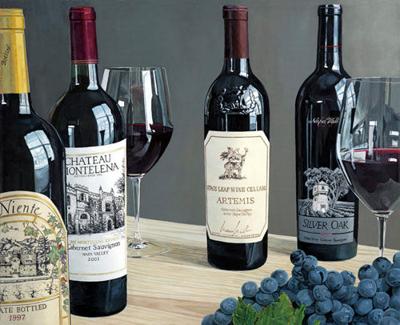Half a century ago, the soft-skinned, finicky-to-grow Viognier (pronounced "vee-ohn-yay") grape had all but disappeared from its ancestral homeland in France’s northern Rhône Valley, a casualty of the late 19th-century phylloxera pest epidemic that devastated the French wine industry. But since the 1980s Viognier’s popularity has surged dramatically with plantings not only in France, but in Italy, Australia, Chile, New Zealand, South Africa, and especially California, where the grape is cultivated the length of the state, from the Napa and Sonoma Valleys to Santa Barbara.
The Viognier grape produces deeply golden-hued wines that are lush and aromatic, low in acid and dry in style, with intense perfumes of apricots, honeysuckle, peaches, violets, acacia, and orange blossoms.
On the palate, Viognier overflows with flavors of stone fruits like apricot and peach and tropical fruits like mango, pineapple, guava, and kiwi. Stainless steel fermentation accentuates the fruit and floral aspects, producing a wine that is lean and crisp with hints of mineral or stone; partial aging in oak barrels adds layers of vanilla and spice.
Some vintners subject the wine to a full or partial secondary malolactic fermentation in oak barrels to induce a creamy, buttery mouth feel, although even without wood aging, Viognier can be as voluptuous as a fully-oaked Chardonnay.
Despite its desirable marriage of perfume and body, winemakers can have a love-hate relationship with Viognier, finding it a challenging grape to grow. Easily infected by mildew, it also suffers from low and unpredictable yields. The grapes must be harvested only when fully ripe — if picked too early, the resulting wines are thin and lacking the characteristic rich aromas and flavors; if harvested too late, they are highly alcoholic, oily, and devoid of aromatics.
Because Viognier is low in acid, its fruit flavors are volatile and will dissipate with long aging and so the wine should be consumed young.



(0) comments
Welcome to the discussion.
Log In
Keep it Clean. Please avoid obscene, vulgar, lewd, racist or sexually-oriented language.
PLEASE TURN OFF YOUR CAPS LOCK.
Don't Threaten. Threats of harming another person will not be tolerated.
Be Truthful. Don't knowingly lie about anyone or anything.
Be Nice. No racism, sexism or any sort of -ism that is degrading to another person.
Be Proactive. Use the 'Report' link on each comment to let us know of abusive posts.
Share with Us. We'd love to hear eyewitness accounts, the history behind an article.